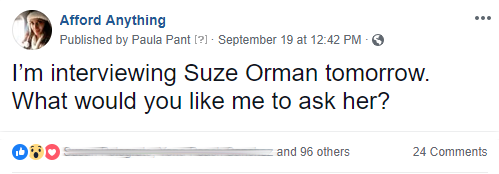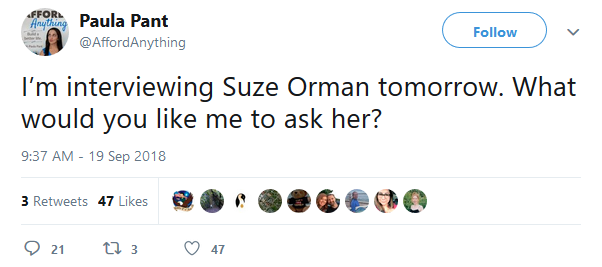 A few weeks ago, Suze Orman’s team reached out to me and asked if I’d be interested in chatting with Suze on my podcast.
A few weeks ago, Suze Orman’s team reached out to me and asked if I’d be interested in chatting with Suze on my podcast.
“Duh,” I replied.
Suze Orman is one of the most famous voices in the world of personal finance. From 2002 to 2015, she hosted The Suze Orman Show on CNBC. She’s the author of 10 mega-bestselling books, she wrote a financial column for O, The Oprah Magazine, and she’s made multiple appearances on The Oprah Winfrey Show.
I read her latest book in preparation for the interview, but I felt at a loss for what to ask her. So I turned to my audience, knowing that many of the people who read my blog and listen to my podcast are also Suze fans.
I headed to Twitter and Facebook and asked this community, “What would you like me to ask Suze?”


Dozens of replied flooded in, but one question stood out far ahead of all others in popularity: What does Suze Orman think about the FIRE movement?
I opened with that question. And Suze’s response shocked me.
“I hate it,” she replied. “I hate it. I hate it. I hate it. And let me tell you why.”
That’s a direct quote. (Really.)
She spent the next 30 minutes explaining why she thinks pursuing FIRE could be the biggest mistake of a person’s life.
Yes, she actually used the words “biggest mistake.” That’s also a direct quote. She claimed that you need “$20 [million], $30 [million], $50 [million] or $100 million dollars” in order to retire early. She cited $10 million as a minimum. She said you’d need to plan to live on at least $350,000 per year.
“Two million is nothing,” she said. “It’s nothing. It’s pennies in today’s world, to tell you the truth.”
Well, then.
Why does Suze Orman hate the FIRE movement?
Why does she think that retirement expenses would need to be so sky-high?
And how can the average middle-class person prepare for retirement, given that the majority of Americans don’t make six figures, let alone have portfolios in the multimillions?
Find out in today’s episode.
You can download the transcript for free here:
Download the episode here:
Share your comments on Facebook, Twitter and Instagram!
Thanks to our sponsors!
Tomorrow.me
Many of our listeners are planning for retirement, but how many are creating wills, or revocable trusts? Both are equally important for our financial futures. Creating a will might seem daunting or scary, but thankfully, Tomorrow.me has you covered. They’ve made what is otherwise an emotionally draining task quick, easy, and accessible. You can create a free will in minutes by signing up on tomorrow.me/paula.
Blue Apron
 Do you spend more money at restaurants (or ordering take-out) than you’d like? If so, check out Blue Apron. For less than $10 per person per meal, Blue Apron delivers seasonal recipes along with pre-portioned ingredients to make delicious, home-cooked meals. Get 3 meals FREE at BlueApron.com/afford.
Do you spend more money at restaurants (or ordering take-out) than you’d like? If so, check out Blue Apron. For less than $10 per person per meal, Blue Apron delivers seasonal recipes along with pre-portioned ingredients to make delicious, home-cooked meals. Get 3 meals FREE at BlueApron.com/afford.
ShipStation
ShipStation is a centralized platform where you can process shipping orders. They have shipping labels for all the top carriers, and they offer deep discounts on shipping. Try ShipStation for free for 30 days and get an additional month free if you use my promo code Paula. Click this link, then click on “heard our ad?” on the top right of the screen, and type Paula.
Gusto
Gusto makes payroll, benefits, and HR easy for modern small businesses. In fact, 72% of customers spend less than 5 minutes to run payroll! If you sign up at gusto.com/paula, you’ll receive 3 months free once you run your first payroll.